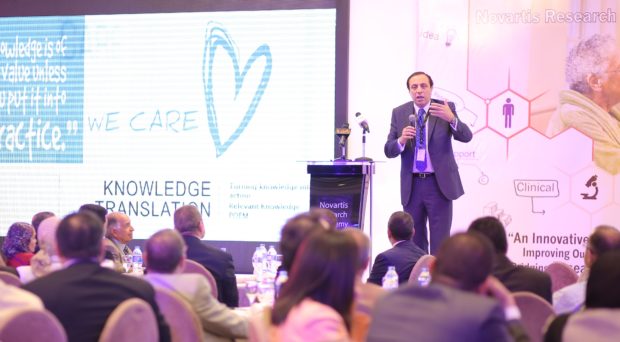
Welcome to our SDG Editorial Board Members blog collection. We are hearing from the Editorial Board Members of the BMC Series journals whose work aligns with achieving the Sustainable Development Goals. Here you can find other posts in this collection, grouped with the tag ‘SDG editorial board members’.
I am an Egyptian Professor of Obstetrics and Gynecology. I work as a consultant of Obstetrics and Gynecology at a University Hospital, one of the largest maternity hospitals in the Middle East and Africa, with more than 16,500 births per year. A decade ago, I established the Egyptian Center of Evidence-Based Medicine (ECEBM) to produce and disseminate high quality synthesis of research evidence, to support guideline development, and to strengthen research capacity in developing countries. I am a Senior Editorial Board Member of BMC Pregnancy and Childbirth. I am grateful for the opportunity to be part of the editorial board to help the research community and to learn from them. I have particular interest in research related to high-risk pregnancy, preterm birth, and reproductive health. I contribute as a member of Guideline Development Groups of several international organizations to produce synthesized evidence and develop evidence-based clinical practice guidelines. Recently I contributed as a regional coordinator for the WHO Global Maternal Sepsis Study. Currently, I contribute as a principal investigator to an international multi-country multi-center randomized trial for women with severe pre-eclampsia. Further, I lead a group of research fellows at the ECEBM in collaboration with the WHO in multiple research projects related to women’s reproductive span, maternal age at first and last birth, and finally the indicators of fertility care. Recently, we have published a synthesis of research evidence regarding the effects of self-administered versus healthcare provider-administered subcutaneous medroxy progesterone for improving continuation of contraceptive use. We have shown that self-administration, compared to provider-administration, increased continuation of contraceptive use. Self-injection appears to be making more of an impact on continuation for younger compared to older women and on women living in low- and middle-income compared to high-income countries.
Self-care contributes to reproductive healthcare by enhancing health literacy, empowering women and lowering pressure on health systems.
Link to the SDGs
Our recent published evidence synthesis and current work are directly related to at least two SDG goals, namely Goals 3 (Good health and wellbeing) and 5 (Gender equality). The work will help to reduce maternal mortality, to ensure universal access to sexual and reproductive health-care services, including for family planning, and to achieve gender equality and empower all women and girls.
Self-care refers to the ability of individuals, families and communities to promote health, prevent disease, maintain health, and to cope with illness and disability with or without the support of a healthcare provider. Self-care contributes to reproductive healthcare by enhancing health literacy, empowering women and lowering pressure on health systems. The value of self-care goes beyond its impact on resource constraints. Self-care interventions give women greater choice, access, control, satisfaction and affordable options to manage their reproductive health needs. This will help achieve health-related SDGs and cost savings to health systems. The COVID-19 pandemic has highlighted the unique and critical role that self-care interventions have played in mitigating disease and saving lives through personal self-care actions such as wearing masks and physical distancing, and prioritization at national levels of self-care interventions such as smoking cessation, exercise, healthy diet, personal hygiene, etc., that people can use during period of lockdown.
Challenges and future directions
We need to work together to reduce research waste. Each step in the design, conduct, and analysis of clinical studies must be rigorous to avoid misleading results and wasting valuable resources. We need to mandate the public availability of a detailed written protocol with each manuscript submitted for publication. Several challenges exist globally. These include failure to involve knowledgeable methodologists from the outset and failure to train clinical researchers, who are usually overwhelmed by their clinical workload and duties. More attention is mandatory to the issue of research reproducibility. Finally, reward systems incentivize quantity more than quality, and novelty more than reliability, leading to a flood of publications that might be methodologically flawed, misleading, or at the very least decent but not useful. This needs to be rectified if we care to reduce research waste.

We must make scientific research FAIR (Findable, Accessible, Interoperable and Reusable). The first step in (re)using research data is to find them. Metadata and data should be easy to find for both humans and computers. Once we find the required data, we need to know how they can be accessed. The data need to inter-operate with applications or workflows for analysis, storage, and processing. The goal is to optimize the reuse of data. To achieve this, metadata and data should be well-described so that they can be replicated and/or combined using different methods of evidence synthesis.
We need to expand our implementation research that addresses implementation bottlenecks, identifies optimal approaches for a particular setting, and promotes the uptake of research findings. It is critical for obstetricians to understand the most effective pathways from research to practical application. Implementation research, being systematic, multidisciplinary, contextual, and complex, is essential in obstetrics and gynecology because it addresses the challenges of the know-do gap in real-world settings and the practicalities of achieving national and global health goals.
In short, I believe we need better research, not only more research.
Comments